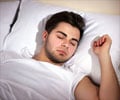Getting asleep between 10:00 and 11:00 pm is found as an ideal time to lower the risk of evolving heart disease when compared to later or earlier sleep times.
Highlights:
- Heart diseases are the leading cause of death in the United States
- A new study has found that sleep onset between 10:00 and 11:00 pm reduces the risk of developing heart diseases
- Moreover, late-onset sleep was associated with a 25% greater risk of cardiovascular diseases
Read More..
Sleep and Circadian Rhythm
“The body has a 24-hour internal clock, called circadian rhythm, that helps regulate physical and mental functioning. While we cannot conclude causation from our study, the results suggest that early or late bedtimes may be more likely to disrupt the body clock, with adverse consequences for cardiovascular health,” says study author Dr. David Plans of the University of Exeter, UK. A night of good sleep is an important aspect of one’s life that is regulated by the body’s circadian rhythm/biological clock. Sleep plays a vital role in promoting overall physical and mental health by healing and repairing various organs like the heart, brain, and blood vessels.This subsequently reduces the risk of chronic diseases like diabetes, high blood pressure, heart diseases, stroke, and kidney diseases.
Our biological or circadian clock is responsible for synchronizing almost all our body’s natural rhythms of light and dark. Disrupting this clock might bring all the process to a halt including cardiovascular health.
Sleep and Heart Health
Various studies have explored the association between the duration of sleep and cardiovascular disease.However, the link between sleep timing and heart disease remains underexplored. The present study thus studied this relationship between objectively measured sleep onset (rather than self-reported) in adults.
Study Design
A large sample size of 88,026 adults from the UK Biobank was enrolled between 2006 and 2010 for the study. The average age of the participants was 61 years (43 to 79 years), with 58% of them being women.The team used a wrist-worn accelerometer to collect the data on sleep onset and waking up time over seven days. Other details related to their lifestyle, demographics, health, and physical assessments were obtained.
The participants were further followed up to screen for any new diagnosis of cardiovascular diseases like heart failure, heart attack, chronic ischemic heart disease, transient ischemic attack, and stroke.
Incidence of Cardiovascular Diseases
It was found that nearly 3,172 participants (3.6%) of total participants had developed cardiovascular disease during the follow-up of 5.7 years.However, its incidence was lowest among those who had sleep onset from 10:00 to 10:59 pm and highest among those with sleep times at midnight or later.
The participants were further adjusted for age, sex, smoking status, diabetes, blood cholesterol, body mass index, blood pressure, sleep duration, sleep irregularity (varied sleep and awake times), self-reported chronotype (early bird or night owl), and socioeconomic status to derive link between sleep onset and cardiovascular events.
Risk of Late Sleep
When compared to participants who went to sleep onset from 10:00 to 10:59 pm, the following was found:- Late-onset sleep at midnight or later was associated with a 25% greater risk of cardiovascular disease
- Sleep onset between 11:00 and 11:59 pm was associated with a 12% greater risk
- In addition, among those falling asleep before 10:00 pm, there was a 24% elevated risk
- The association was even stronger in women, with only sleep onset before 10:00 pm remaining significant for men.
Sex-Associated Differences
The study team stated that the exact reason for a stronger relationship between sleep onset and cardiovascular disease in women was not clear.“It may be that there is a sex difference in how the endocrine system responds to a disruption in circadian rhythm. Alternatively, the older age of study participants could be a confounding factor since women’s cardiovascular risk increases post-menopause—meaning there may be no difference in the strength of the association between women and men,” says Dr. Plans.
The study further states that although there was no causal aspect obtained for delayed sleep as the potential cardiac risk factor, good sleep was strongly linked to better health.
Further validation through future studies may thereby help reinforce the benefits of basic sleep hygiene and timing as a low-cost intervention to reduce the risk of heart diseases.
Facts on Heart Attack
- Heart diseases are the leading cause of death for most people in the United States.
- One in every six deaths from cardiovascular disease was due to stroke in 2018.
- Heart attacks are silent (the person is not aware of it) in every 1 in 5 individuals.
- Every 40 seconds, someone has a heart attack, and every 4 minutes in the United States.
References:
- Circadian Rhythms - (https://www.nigms.nih.gov/education/fact-sheets/Pages/circadian-rhythms.aspx)
- Heart Disease Facts - (https://www.cdc.gov/heartdisease/facts.htm)
Source-Medindia















